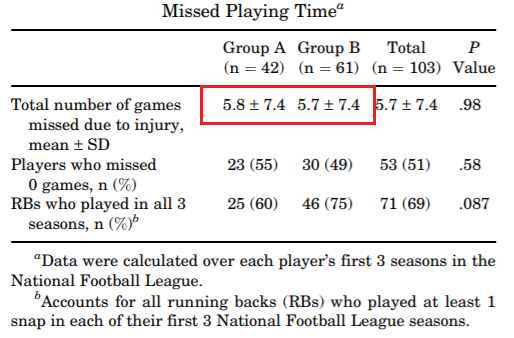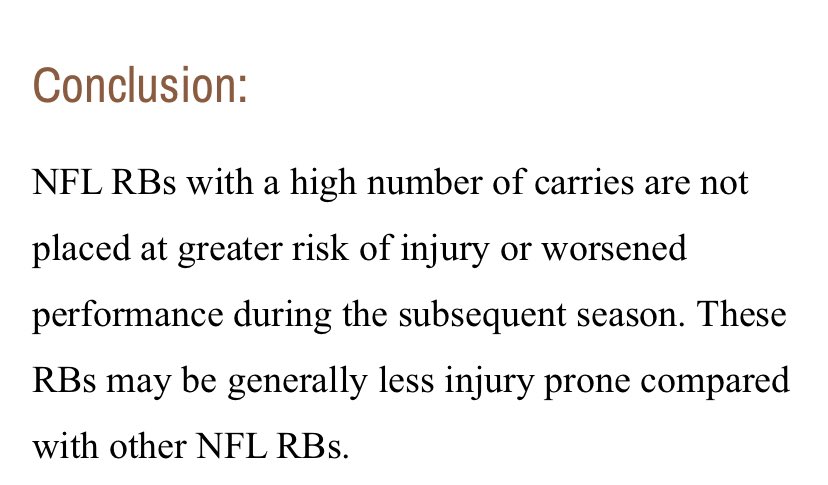Hypothesis: there is objective evidence that high RB “mileage” causes injury/more missed time compared to moderate RB “mileage”
Alt hypothesis: there is no objective evidence high RB “mileage” causes injury/more missed time compared to moderate RB “mileage”
Here we go
1/ https://twitter.com/FBInjuryDoc/status/1263528838237229057
Alt hypothesis: there is no objective evidence high RB “mileage” causes injury/more missed time compared to moderate RB “mileage”
Here we go
1/ https://twitter.com/FBInjuryDoc/status/1263528838237229057
Study 1 facts:
From 1999-2012 103 NCAA RBs were separated into 2 groups
Group A (GA)=100-200 carries in final NCAA season
Group B (GB)=250+ carries final NCAA season
No statistically significant difference in age/size between groups
2/
From 1999-2012 103 NCAA RBs were separated into 2 groups
Group A (GA)=100-200 carries in final NCAA season
Group B (GB)=250+ carries final NCAA season
No statistically significant difference in age/size between groups
2/
In first 3 years of NFL:
GA averaged 276 carries
GB averaged 376 carries
GA averaged 5.8 missed games due to injury
GB averaged 5.7 missed games due to injury
No diff b/w groups in players missing at least 1 game due to injury
Groups missed same amount of time due to injury
3/
GA averaged 276 carries
GB averaged 376 carries
GA averaged 5.8 missed games due to injury
GB averaged 5.7 missed games due to injury
No diff b/w groups in players missing at least 1 game due to injury
Groups missed same amount of time due to injury
3/
Study 2:
From 2004-2014 NFL RBs were separated into 2 groups
G1=150-250 carries in at least 1 season
G2=300+ carries in at least 1 season
(so GA from study 1=G1 in study 2. GB from study 1=G2 from study 2)
NCAA RBs w/ heavy workloads= heavy workloads in NFL
No dif in age/size
4/
From 2004-2014 NFL RBs were separated into 2 groups
G1=150-250 carries in at least 1 season
G2=300+ carries in at least 1 season
(so GA from study 1=G1 in study 2. GB from study 1=G2 from study 2)
NCAA RBs w/ heavy workloads= heavy workloads in NFL
No dif in age/size
4/
Each RB was tracked over 2 seasons
G2 missed fewer games than G1
G2 averaged 9 years in the NFL
G2 averaged 8 years in the NFL
this was *statistically significant* meaning there's less than a 5% chance this is mathematically incorrect
5/
G2 missed fewer games than G1
G2 averaged 9 years in the NFL
G2 averaged 8 years in the NFL
this was *statistically significant* meaning there's less than a 5% chance this is mathematically incorrect
5/
So even if we say "there's no evidence, one way or the other, that 'mileage'=decreased career length and/or injury risk' the onus is still on naysayers to provide evidence to disprove this "neutral" conclusion.
Author's conclusions:
6/6
Author's conclusions:
6/6

 Read on Twitter
Read on Twitter





